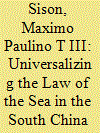| Srl | Item |
| 1 |
ID:
153272


|
|
|
|
|
| Summary/Abstract |
Many international legal experts believe that the Philippines v. China arbitration award of 12 July 2016 represents a game changer for South China Sea dispute settlements because the award has brought a breathtaking legal clarity to the complex disputes. This article argues that the sweeping nature of the award had a very paradoxical effect on Chinese policy. The arbitration ruling has led to the hardening of China’s claims, but it has also raised a new readiness among Chinese policymakers to renew negotiations. The sweepingness of the award makes it hard for the Philippines to reach a negotiated compromise with China on the basis of the award, but it also presents a surprising political opportunity in regional politics for the major actors involved to lower tensions and recalibrate policies. Although China’s new readiness to negotiate is welcome, the overall impact of the three-and-a-half-year-long arbitration is likely to create a deadlock in negotiations in the near future. Paradoxically, this may raise the importance of political and power-centred approaches to regional dispute settlements, as the legal approach embodied by arbitration continues to meet Chinese defiance.
|
|
|
|
|
|
|
|
|
|
|
|
|
|
|
|
| 2 |
ID:
148500


|
|
|
|
|
| Summary/Abstract |
John Mearsheimer has compared China’s attitude towards the South China Sea to the Monroe Doctrine of the United States. Mearsheimer does not accord international law much weight and certainly does not regard it as determinative of political outcomes. But many observers of China’s disputes in the South China Sea look to international law for rules and processes that could facilitate peaceful resolution of the disputes. In doing so they are variously puzzled, bemused, and/or angered by China’s assertion of the nine-dash line (南海九段线). This article draws more broadly on the literature on the Monroe Doctrine, viewing the doctrine as: a unilateral pronouncement of foreign policy; representing resistance; embedded in domestic as opposed to international law; and an assertion of legitimate regional hegemony. Through applying the analogy of the Monroe Doctrine, the article seeks fresh insights into China’s legal position in relation to the South China Sea and into the significance of the nine-dash line in terms of international law.
|
|
|
|
|
|
|
|
|
|
|
|
|
|
|
|
| 3 |
ID:
152773


|
|
|
|
|
| Summary/Abstract |
Historic titles and historic rights have been a complicated issue in the law of the sea both conceptually and practically. The South China Sea Arbitration between the Philippines and China raised important issues regarding the contemporary relevance and validity of historic claims, and the relationship between the Law of the Sea Convention and historic rights. This articles examines historic rights and historic titles in the law of the sea in the light of the South China Sea Arbitration and evaluates the contribution of the Tribunal's Awards to the clarification of these concepts.
|
|
|
|
|
|
|
|
|
|
|
|
|
|
|
|
| 4 |
ID:
159408


|
|
|
|
|
| Summary/Abstract |
This article argues that a resolution of the maritime disputes in the South China Sea must be based upon a universalist framework where the maritime interests of the world are upheld. The article discusses the universalist framework of the 1982 United Nations Convention on the Law of the Sea (UNCLOS) and the universalist approach taken by the Tribunal on 12 July 2016 in the South China Sea Arbitration regarding the extinguishment of a state's “exceptionalist” maritime claims and the adoption of strict criteria for the characterization of features at sea.
|
|
|
|
|
|
|
|
|
|
|
|
|
|
|
|